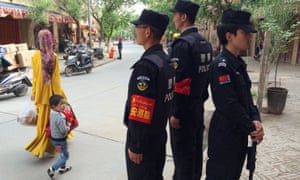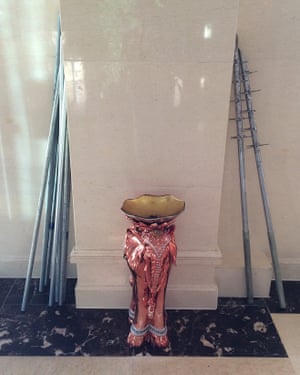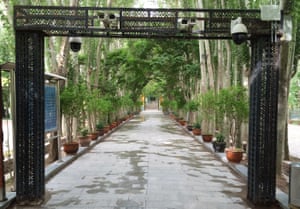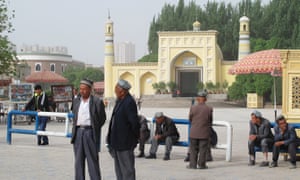In China’s far west the ‘perfect police state’ is emerging

The Guardian, 23 June 2017

By Tom Phillips — It was Friday, the Islamic day of assembly, but outside Kashgar’s Id Kah mosque on Liberation Avenue it was the growl of diesel engines that filled the air not a muezzin’s wistful cry.
One by one armoured personnel carriers, some with machine guns poking from their turrets, rolled towards People’s Square where a 12-metre statue of Mao Zedong was preparing to preside over the latest in a series of tub-thumping “anti-terror” rallies to be held here in the heartlands of China’s Muslim Uighur minority this year.
Open-backed lorries packed with heavily-armed troops joined the procession, red and yellow propaganda banners draped from their sides.
“Unity and stability are blessings! Separatism and unrest are a curse!” read one.
A second warned: “Let all those terrorists who dare to be enemies of the people be smashed to pieces!”
To ensure the march went off without a glitch, police had placed this entire city of about half a million inhabitants on lock down. “All the roads are blocked,” said a black-clad officer who was posted outside the mosque with a 12 gauge shotgun slung across his chest.
The mass rally, witnessed by the Guardian at the end of April, came as a long-running crackdown in China’s violence-stricken far west hit draconian new heights.
Three days earlier thousands of armed troops had swept onto the streets of Urumqi, the capital of Xinjiang, where, according to one local newspaper, they vowed to “sacrifice everything for the party and the people” in their fight against the Islamic extremists Beijing blames for a series of attacks on government officials and civilians.
“Please rest assured, my fellow countrymen, that I will … crack down on the arrogance of those violent gangs and terrorists so they are left with no road to go down and no place to hide,” one participant told reporters.
A week before, more than 1,000 troops flooded Aksu, a city in Xinjiang’s south, for a three-day show of strength. “Suddenly a siren rang out and vehicles shot out onto the streets like swords being drawn from their sheaths,” read an account of the event by one local propaganda writer.
‘The perfect police state’
The parades are part of a wider security escalation that has gripped China’s western frontier since Chen Quanguo, a Communist party hardliner who Beijing credits with quelling a wave of unrest in Tibet, was drafted into Xinjiang last summer.
Adrian Zenz, a researcher who has studied the securitisation of both politically sensitive regions, said China’s leaders believed Chen had managed to contain a surge in self-immolations in the Tibet Autonomous Region, using a series of innovative and repressive policies such as high-tech surveillance and the introduction of tight social controls.

Now, they hoped he could do the same in Xinjiang, a vast and resource-rich borderland that has endured decades of bloodshed including anti-government uprisings, ethnic rioting and, more recently, terrorist attacks targeting civilians. “I’m sure he has been sent there … to pacify Xinjiang,” said Zenz, from Germany’s European School of Culture and Theology.
Chen has wasted no time in putting his controversial ideas into practice. Since he became Xinjiang’s party chief last August thousands of security operatives, ranging from elite special forces to poorly trained rookies, have been deployed onto the streets of villages, towns and cities. Many are low-level surveillance officers tasked with keeping tabs on the region’s 23m inhabitants and – above all – members of the 10m-strong Uighur minority.
Zenz said the recruitment of security staff in Xinjiang had gone “absolutely through the roof” under Chen’s rule. In the first five months of this year, 31,000 such jobs were advertised – more than the entire total between 2008 and 2012. Last year a record 32,000 security agents were hired.
“[It is] almost like in the old East Germany,” Zenz said. “The perfect police state.”
“What are they going to do? Start a war?”

During a week-long road trip through southern Xinjiang, the Guardian saw first-hand how the unfolding security surge was affecting life across the region.
In a village near Upal, a Uighur market town 50km south of Kashgar, members of one local militia lined up in the main square, wielding 5ft metal rods, for what are now daily security drills. Nearby, the white and green armoured personnel carriers of China’s paramilitary People’s Armed Police raced past, along a corridor of white poplars. “I haven’t seen so many roadblocks since the last time I was in Hebron,” said a European traveller who had come to the region in search of the ancient Silk Road but had instead stumbled across scenes from a conflict zone.
Further south in Tashkurgan, a town on the border with Pakistan, an alarm sounded and shopkeepers rushed into the street brandishing poles and clubs. At a local hotel, the receptionist greeted guests in a black stab jacket; a medieval-style cudgel, spikes soldered into its tip, was propped up against the entrance near a metal detector.
Down the road another drill was underway with police training local men and women to bludgeon imaginary assailants with an arsenal of improvised hand-held weapons. “One, two, three,” the group shouted in unison, pummeling their invisible targets on the final count.

The effects of Chen’s surge are also impossible to miss in Kasghar itself, a 2,000-year-old Silk Road oasis town where petrol stations, considered possible targets, now resemble prisons, with vehicles only allowed through their razor-wire perimeters one at a time.
By night the city lights up like a flickering disco ball as hundreds of newly built police strongholds, positioned at almost every intersection, illuminate the darkness with their red and blue glow.
As the sun rises, guards with clubs that resemble giant rolling pins and halberd-style spears assemble outside schools, shops and government buildings. Surveillance vehicles cruise the streets and troops with assault rifles man checkpoints on the outskirts of town, searching boots and demanding documents from commuters who are ordered off yellow city buses. It is almost impossible to walk without running into a security agent of some description.
“It’s extreme now,” sighed one local, who said they were shocked by the scale of the recent parades. “What are they going to do? Start a war?”
The crackdown has been accompanied by a ratcheting up of controls on religion in a place where it was already forbidden for under-18s to enter mosques, to broadcast calls to prayer or make unauthorised pilgrimages to Mecca.
This year there have been reports of authorities forbidding ‘Islamic’ names such as Islam, Muhammad or Mecca, outlawing face veils and “abnormal” beards and even ordering imams to praise Chinese President Xi Jinping during religious services.
At Kashgar’s Id Kah mosque – where the pro-Beijing imam was stabbed to death in the summer of 2014 – worshippers file out through an arch fitted with at least six CCTV cameras. A nearby sign in English for tourists reads: “All ethnic groups warmly welcome the party’s religious policy … All ethnic groups live friendly together here.”
Social controls have also been stepped since Chen took office with some citizens have reportedly being told to surrender their passports to police while others have been instructed to install GPS tracking devices in their vehicles. There are plans for the mass collection of DNA samples a move human rights campaigners lamented as a sign Beijing was taking “its Orwellian system to the genetic level”.

‘I would prefer to be a Syrian refugee’
Daily life in Xinjiang goes on in spite of the crackdown. “It’s like this every day. It’s normal,” shrugged one Kashgar resident as a convoy of armoured vehicles sped by. But the tightening has pushed others to breaking point. Fighting back the tears, one young Uighur clutched this reporter’s arm as they described their growing despair at the repression and hope – one day – of fleeing overseas.
“I would prefer to be a Syrian refugee than Chinese,” they said, their hands trembling. “This is hell for me.”
Another resident captured the almost universal fear of discussing, let alone questioning, the changes sweeping the region. “The system is very tight, so we must be careful.” In 2014, Ilham Tohti, a Uighur intellectual known for his moderate public criticism of Beijing’s policies in the region, was jailed for life for separatism.
Nick Holdstock, a British author who has written two books on Xinjiang, cautioned against lumping all Uighurs together as members of an “entirely down-trodden, oppressed minority”. “On some level things are getting better in Xinjiang. The infrastructure is improving. Its economy is quite healthy.”
But Holdstock said the outlook for Uighurs had grown increasingly bleak over the last three decades, with cultural and religious controls ramping up after a succession of now-notorious outbreaks of ethnic violence in 1990, 1997 and 2009.
“There is no sense in [the government’s] minds that anything that they are doing is necessarily part of the problem. It is the sense that the more troops you can have, the more security checkpoints, then that is the way to keep going.”Wang Hongwei, a national security expert at Beijing’s Renmin University, said the “high-pressure crackdown” was designed to intimidate Islamist militants who threatened China’s national and political systems. “They are like millipedes whose bodies keep wriggling even when they are being cut into pieces,” Wang said, claiming there was nothing “excessive at all” about the recent mass parades.

Authorities defend the tightening as a necessary offensive against extremists they blame for a series of horrific attacks on civilians, such as a machete attack on a train station in Kunming and a bombing in Urumqi.
But many experts – who believe much of the violence is fuelled not by religious extremism but economic exclusion, government meddling and the erosion of Uighur culture and traditions – fear clamping down further will only breed more resentment and bloodshed.
“I think they are going at the flies with a sledgehammer,” said one western Xinjiang scholar who asked not to be named for fear of not being allowed back into the country.
Zenz meanwhile warns the current policy by Beijing could inflame rather than extinguish anti-government anger.
“Xinjiang is a powder-keg … much more so than Tibet,” he said “The combination of securitisation and crackdown on normal religious practise is an absolute recipe for disaster … This is absolutely a ticking time-bomb.”
Additional reporting by Wang Zhen

